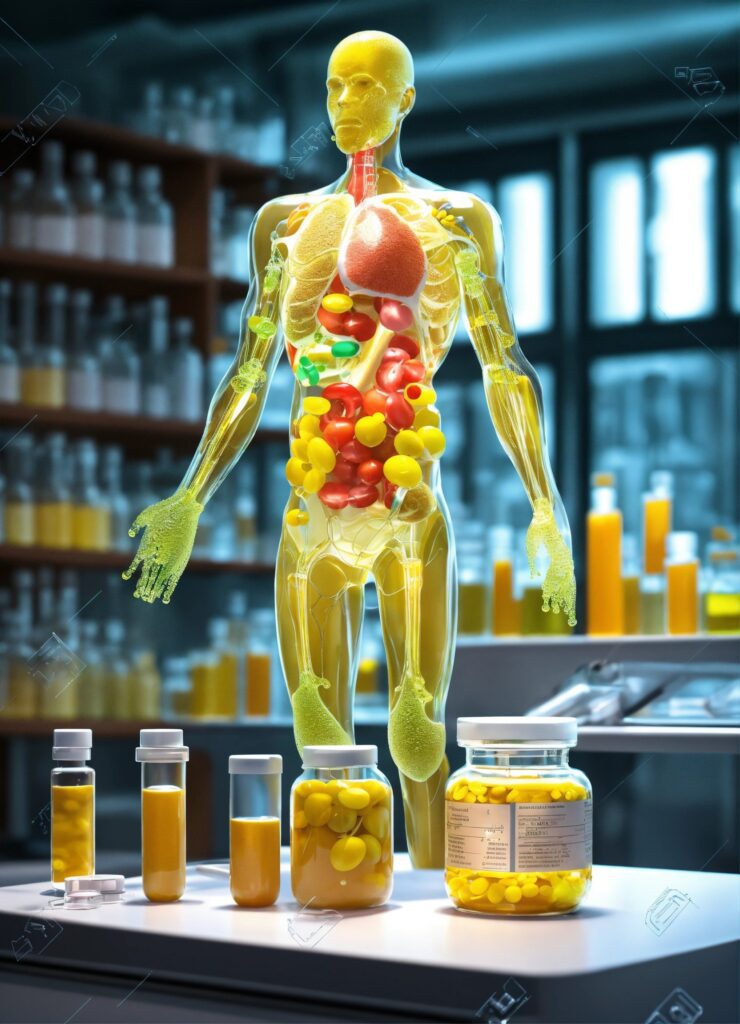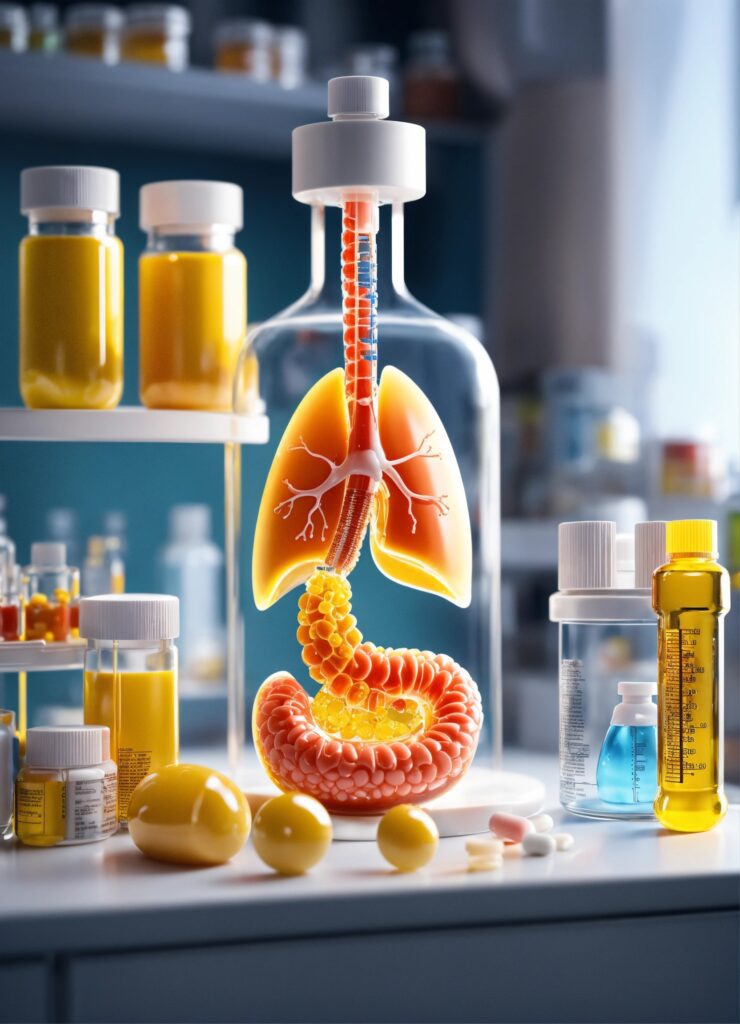
1. Introduction
Removing Body Toxins with Food: Fact or Fiction?
In a world where detoxification and the removal of body toxins are hot topics, many people are turning to specific foods in the hopes of achieving a healthier, toxin-free body. But is there any truth behind these claims? Can certain foods really help eliminate toxins from our bodies? In this blog post, we will delve into the available information and provide an objective analysis of whether removing body toxins frequently with some foods is supported by scientific evidence.
When it comes to detoxification, our bodies already have a natural system in place to eliminate toxins. Organs such as the liver, kidneys, digestive system, skin, and lungs play vital roles in filtering and eliminating waste products and harmful substances from our bodies. The liver, in particular, is a key player in detoxification, as it processes toxins and converts them into less harmful or water-soluble substances that can be excreted through urine or feces. Similarly, the kidneys filter the blood and remove waste products, while the digestive system eliminates toxins through digestion and bowel movements. Even the skin and lungs have their parts to play in detoxification, excreting toxins through sweat and respiration, respectively.
Detox diets, which involve consuming specific foods or beverages for a certain period, claim to aid in the elimination of toxins from our bodies. However, it is important to note that there is a lack of scientific evidence supporting the effectiveness or necessity of such diets. Many detox diets restrict certain food groups, promote fasting, or rely on liquid-only diets. Some even include dietary supplements claiming to aid in detoxification. But before you jump on the detox bandwagon, it is crucial to approach these diets with caution and be aware of the limited research available.
In fact, there are potential dangers and side effects associated with detox programs. Severe restriction of calorie intake or the elimination of entire food groups can lead to nutrient deficiencies and may not provide the necessary energy for our bodies to function optimally. Dehydration, electrolyte imbalance, and gastrointestinal symptoms are all potential risks of detox programs and products. Additionally, relying solely on liquid diets or fasting can disrupt our body’s natural metabolic processes and may not be sustainable in the long term. Therefore, it is always advisable to consult with a healthcare professional before embarking on any drastic dietary changes.
While the concept of “detoxifying” our bodies with specific foods may lack scientific evidence, there are other ways to support our body’s natural detoxification processes. One of the most important aspects is eating a balanced diet. Consuming a varied diet rich in fruits, vegetables, whole grains, lean proteins, and healthy fats provides essential nutrients that support our body’s natural detoxification mechanisms. By giving our bodies the necessary fuel, we can optimize their ability to eliminate toxins effectively.
Another key factor in supporting our body’s natural detoxification processes is maintaining a healthy gut microbiome. The gastrointestinal system plays a crucial role in detoxification, and a healthy gut microbiome promotes proper digestion and absorption of nutrients while maintaining a balanced microbial ecosystem. Including probiotic-rich foods, such as yogurt and fermented vegetables, in our diet can help support a healthy gut microbiome.
Hydration is also essential for maintaining proper bodily functions, including detoxification. Drinking an adequate amount of water helps the kidneys filter waste products effectively and supports the elimination of toxins through urine. Therefore, staying well-hydrated is crucial for our body’s natural detoxification processes.
Regular physical activity is not only beneficial for our overall health but also aids in the elimination of toxins. Exercise promotes blood circulation, sweating, and respiration, which can help remove toxins through the skin and lungs. Additionally, exercise supports our body’s natural detoxification processes and helps maintain optimal health.
Adequate sleep is another crucial factor in supporting our body’s natural detoxification processes. During sleep, our bodies repair and regenerate cells, including those involved in detoxification. Getting enough quality sleep allows our bodies to carry out these essential processes effectively.
Reducing exposure to harmful substances is yet another way to lessen the burden on our body’s detoxification system. Minimizing exposure to environmental toxins, such as cigarette smoke, air pollution, and harmful chemicals, can significantly reduce the toxins that our bodies need to eliminate.
2. The Body’s Natural Detoxification System

The Liver: The Detoxification Powerhouse
The liver, often referred to as the body’s detoxification powerhouse, plays a central role in eliminating toxins from the body. It processes various substances, such as drugs, alcohol, and environmental pollutants, and converts them into less harmful or water-soluble forms. These substances can then be excreted through urine or feces. Additionally, the liver produces bile, which helps in the digestion and absorption of fats, further contributing to detoxification.
The Kidneys: Filtration and Waste Removal
The kidneys are another crucial component of the body’s natural detoxification system. They filter the blood and remove waste products, excess water, and toxins through urine. The kidneys play a vital role in maintaining electrolyte balance and regulating blood pressure. Staying adequately hydrated supports the proper functioning of the kidneys and ensures effective elimination of toxins.
The Digestive System: Elimination Through Digestion
The digestive system also plays a significant role in detoxification. As food passes through the digestive tract, toxins and waste products are eliminated through bowel movements. A healthy digestive system ensures the efficient removal of these substances, preventing their reabsorption into the bloodstream. Consuming a diet rich in fiber promotes regular bowel movements, aiding in the elimination of toxins from the body.
The Skin and Lungs: Excretion Through Sweat and Respiration
In addition to the liver, kidneys, and digestive system, the skin and lungs also contribute to the body’s detoxification processes. The skin excretes toxins through sweat, acting as a secondary route for their elimination. Engaging in activities that promote sweating, such as exercise or saunas, can aid in the removal of toxins through the skin. The lungs, on the other hand, eliminate toxins through respiration. Deep breathing exercises, fresh air, and avoiding exposure to indoor and outdoor pollutants can support the detoxification process through the lungs.
By understanding the body’s natural detoxification system, we can make informed decisions about how to best support it. While there is limited scientific evidence supporting the effectiveness of specific foods in detoxifying the body, adopting a healthy lifestyle can optimize the body’s natural detoxification processes. In the next section, we will explore the lack of scientific evidence for detox diets and the potential dangers they may pose.
3. Lack of Scientific Evidence for Detox Diets
Detox diets have gained popularity in recent years, with claims that they can eliminate toxins from the body. However, it is important to note that there is a lack of scientific evidence supporting the effectiveness or necessity of these diets. While detox diets may promise quick results and a “cleanse” for the body, it is crucial to approach them with caution and skepticism. Here are some key points to consider regarding the lack of scientific evidence for detox diets:
- Limited research: There is a lack of well-designed scientific studies that specifically examine the effectiveness of detox diets. Many of the claims made by proponents of detox diets are based on anecdotal evidence or personal testimonials, which do not provide reliable scientific proof. Without rigorous scientific studies, it is difficult to determine the true benefits or potential risks of these diets.
- Unreliable detox methods: Detox diets often involve extreme measures such as extreme caloric restrictions, fasting, or the elimination of entire food groups. These methods may disrupt the body’s natural metabolic processes and can lead to nutrient deficiencies. The body’s natural detoxification system is well-equipped to eliminate toxins, and extreme detox methods may not be necessary or beneficial.
- Individual variability: Each person’s body is unique, and their response to detox diets may vary. What works for one person may not work for another. This is another reason why it is important to rely on scientific evidence rather than personal anecdotes or testimonials. The lack of scientific evidence makes it challenging to determine which individuals may benefit from detox diets and which may not.
In conclusion, the lack of scientific evidence for detox diets raises questions about their effectiveness and necessity. While they may be appealing, it is important to approach detox diets with caution and skepticism. Instead of relying on extreme measures, focusing on a balanced diet, staying hydrated, exercising regularly, getting adequate sleep, and reducing exposure to harmful substances are recommended ways to support the body’s natural detoxification processes. Consulting with a healthcare professional before making any significant dietary changes is always advisable to ensure optimal health and well-being.
4. Potential Dangers and Side Effects of Detox Programs

Detox programs and products often claim to eliminate toxins from the body, but it is important to be aware of the potential dangers and side effects associated with these approaches. While some detox programs may seem appealing, it is crucial to approach them with caution. Here are some potential risks and side effects to be aware of:
- Dehydration: Many detox diets encourage increased fluid intake or rely on liquid-only diets, which can lead to dehydration if not properly managed. Dehydration can cause symptoms such as fatigue, dizziness, and headaches. It is essential to ensure adequate hydration during any detox program by drinking plenty of water and electrolyte-rich fluids.
- Electrolyte Imbalance: Some detox programs may involve the use of diuretics or fasting, which can disrupt the body’s electrolyte balance. Electrolytes, such as sodium, potassium, and magnesium, are essential for proper bodily functions. Imbalances can lead to muscle cramps, irregular heartbeat, and other serious health issues. It is important to consult with a healthcare professional before starting a detox program to ensure electrolyte levels are maintained.
- Gastrointestinal Symptoms: Detox programs that involve drastic dietary changes or the use of herbal supplements may cause gastrointestinal symptoms such as bloating, gas, diarrhea, or constipation. These symptoms can be uncomfortable and may persist throughout the duration of the program. It is important to listen to your body and adjust the detox program if these symptoms become severe or persist.
- Nutrient Deficiencies: Detox diets that severely restrict calorie intake or eliminate entire food groups can lead to nutrient deficiencies. The body requires a variety of vitamins, minerals, and macronutrients to function properly. Restricting certain foods may result in inadequate nutrient intake, which can lead to fatigue, weakness, and impaired immune function. It is crucial to ensure that any detox program provides a balanced intake of essential nutrients or consider consulting with a healthcare professional or registered dietitian.
It is important to note that individual responses to detox programs may vary, and it is always best to consult with a healthcare professional before making any significant dietary changes. They can provide guidance based on your specific health needs and help minimize any potential risks or side effects. Remember, supporting the body’s natural detoxification processes through a healthy lifestyle is key, and extreme detox programs may not be necessary or beneficial in the long term.
5. Supporting the Body’s Natural Detoxification Processes

Supporting the body’s natural detoxification processes is key to maintaining overall health and well-being. While there is limited scientific evidence supporting the effectiveness of specific foods in removing toxins from the body, there are lifestyle choices that can optimize the body’s natural detoxification mechanisms.
1. Eating a Balanced Diet: Consuming a varied diet rich in fruits, vegetables, whole grains, lean proteins, and healthy fats provides essential nutrients that support the body’s natural detoxification mechanisms. These foods are packed with antioxidants, vitamins, and minerals that aid in the elimination of toxins and promote overall health.
2. Supporting the Gut Microbiome: The gastrointestinal system plays a crucial role in detoxification. A healthy gut microbiome promotes proper digestion and absorption of nutrients while maintaining a balanced microbial ecosystem. Consuming probiotic-rich foods, such as yogurt and fermented vegetables, can help support a healthy gut microbiome.
3. Hydration: Drinking an adequate amount of water is essential for maintaining proper bodily functions, including detoxification. Sufficient hydration helps the kidneys filter waste products effectively and supports the elimination of toxins through urine. Aim to drink at least 8 glasses of water per day and more if you are physically active or live in a hot climate.
4. Exercise: Regular physical activity promotes blood circulation, sweating, and respiration, which can aid in the elimination of toxins through the skin and lungs. Exercise also helps maintain overall health and supports the body’s natural detoxification processes. Aim for at least 30 minutes of moderate-intensity exercise, such as brisk walking or cycling, most days of the week.
By incorporating these lifestyle choices into your daily routine, you can support your body’s natural detoxification processes and promote overall health and well-being. While there may not be a magic food or quick fix for removing toxins from the body, these practices have been shown to be effective in optimizing the body’s natural detoxification mechanisms. Remember to consult with a healthcare professional before making any significant dietary changes or embarking on a detox program.
6. Eating a Balanced Diet
A balanced diet plays a crucial role in supporting the body’s natural detoxification mechanisms. By consuming a varied range of nutrient-rich foods, we provide our bodies with the necessary resources to eliminate toxins effectively. Let’s explore some key components of a balanced diet that can aid in the removal of body toxins.
Including Fruits and Vegetables
Fruits and vegetables are rich in vitamins, minerals, antioxidants, and fiber, making them essential for maintaining overall health and supporting detoxification. Incorporating a variety of colorful fruits and vegetables into our diet ensures a diverse range of nutrients that can help the body eliminate toxins. Leafy greens, such as spinach and kale, are particularly beneficial due to their high antioxidant content.
Opting for Whole Grains
Choosing whole grains over refined grains is another important aspect of a balanced diet for detoxification. Whole grains, such as quinoa, brown rice, and whole wheat bread, contain more fiber, vitamins, and minerals than their refined counterparts. Fiber aids digestion, promotes bowel movements, and helps eliminate waste products and toxins from the body.
Including Lean Proteins
Lean proteins, such as fish, poultry, beans, and tofu, provide essential amino acids necessary for various bodily functions, including detoxification. Amino acids support liver function, which is vital for processing and eliminating toxins. Including a source of lean protein in each meal helps support the body’s natural detoxification processes.
Healthy Fats for Detoxification
Contrary to popular belief, not all fats are bad for us. Healthy fats, such as those found in avocados, nuts, seeds, and olive oil, play a crucial role in supporting detoxification. These fats provide essential fatty acids that aid in the absorption of fat-soluble vitamins and support the health of the liver, the primary organ involved in detoxification.
Staying Hydrated with Water
Water is a fundamental component of a balanced diet and essential for detoxification. Staying hydrated helps the kidneys filter waste products effectively and supports the elimination of toxins through urine. Drinking an adequate amount of water throughout the day also promotes healthy digestion and helps maintain overall bodily functions.
Incorporating these elements into our daily diet promotes a well-rounded and balanced approach to detoxification. By providing the body with the necessary nutrients, we support its natural detoxification processes and help eliminate toxins effectively. It is important to remember that individual dietary needs may vary, and consulting with a healthcare professional or registered dietitian can provide personalized guidance for achieving optimal detoxification through a balanced diet.
By making conscious choices and prioritizing a variety of nutrient-rich foods, we can support our body’s natural detoxification system and enhance overall health and well-being. Remember, it’s not about quick fixes or restrictive diets, but rather adopting a sustainable and balanced approach to nourishing our bodies.
7. Supporting the Gut Microbiome
The health of our gut microbiome plays a crucial role in supporting the body’s natural detoxification processes. The gastrointestinal system is responsible for the digestion and absorption of nutrients, as well as maintaining a balanced microbial ecosystem. Here are some ways we can support our gut microbiome:

- Consuming Probiotic-Rich Foods: Probiotics are beneficial bacteria that help maintain a healthy balance of microbes in the gut. Foods like yogurt, kefir, sauerkraut, and kimchi are rich in probiotics and can help support a healthy gut microbiome.
- Including Prebiotic Foods: Prebiotics are a type of fiber that act as fuel for the beneficial bacteria in our gut. They can be found in foods like onions, garlic, bananas, asparagus, and whole grains. Including these foods in our diet can help nourish our gut microbiome.
- Avoiding Excessive Use of Antibiotics: While antibiotics are necessary in certain situations, their overuse can disrupt the balance of bacteria in our gut. It’s important to only use antibiotics when prescribed by a healthcare professional and to follow their instructions carefully.
- Managing Stress: Stress can impact the balance of our gut microbiome. Engaging in stress-reducing activities like meditation, yoga, deep breathing exercises, or spending time in nature can help support a healthy gut microbiome.
- Avoiding Artificial Sweeteners: Some studies suggest that artificial sweeteners can negatively impact the gut microbiome. It’s best to limit our intake of artificial sweeteners and opt for natural sweeteners like honey or maple syrup instead.
- Limiting Processed Foods: Processed foods, high in sugar, unhealthy fats, and additives, can disrupt the balance of our gut microbiome. Opting for whole, unprocessed foods can help nourish our gut microbiome.
Supporting our gut microbiome is essential for maintaining overall health and supporting the body’s natural detoxification processes. By incorporating probiotic-rich and prebiotic foods, avoiding excessive use of antibiotics, managing stress, avoiding artificial sweeteners, and limiting processed foods, we can promote a healthy gut microbiome and optimize our body’s natural detoxification mechanisms.
8. Hydration

Proper hydration is essential for maintaining overall health and aiding in the body’s natural detoxification processes. Water plays a vital role in flushing out toxins and waste products from the body through urine and sweat. It helps keep the kidneys functioning optimally, allowing them to filter waste effectively.
Drinking an adequate amount of water throughout the day is crucial for staying hydrated. The recommended amount varies depending on factors such as age, sex, activity level, and climate. However, a general guideline is to aim for at least eight glasses of water per day, or about two liters.
In addition to plain water, incorporating other hydrating beverages such as herbal teas, infused water, and coconut water can add flavor and variety to your hydration routine. These alternatives can also provide additional nutrients and antioxidants that support the body’s natural detoxification processes.
It’s important to note that not all beverages contribute to proper hydration. Drinks such as sugary sodas, energy drinks, and alcoholic beverages can have dehydrating effects and should be consumed in moderation. Caffeinated beverages like coffee and tea can have a mild diuretic effect, but they can still contribute to overall hydration when consumed in moderation.
To ensure adequate hydration, it’s helpful to listen to your body’s thirst cues. If you feel thirsty, it’s a sign that your body needs fluids. Additionally, monitoring the color of your urine can provide clues about your hydration status. Clear or light yellow urine typically indicates proper hydration, while dark yellow urine may indicate dehydration.
In conclusion, staying hydrated is crucial for supporting the body’s natural detoxification processes. Drinking an adequate amount of water and hydrating beverages throughout the day helps flush out toxins, maintain proper kidney function, and promote overall health. Remember to listen to your body’s thirst cues and choose hydrating beverages wisely. By prioritizing hydration, you can contribute to your body’s detoxification efforts and enhance your overall well-being.
9. Exercise
Regular physical activity is not only essential for maintaining overall health but also plays a crucial role in supporting the body’s natural detoxification processes. When we engage in exercise, our blood circulation increases, leading to improved oxygen and nutrient delivery throughout the body. This enhanced circulation helps to flush out toxins from our organs and tissues.
In addition to promoting blood flow, exercise also stimulates sweating and respiration, which are important avenues for eliminating toxins from the body. Sweat contains trace amounts of toxins, and through exercise, we can increase our sweat production, effectively expelling these harmful substances. Similarly, deep breathing during exercise allows for the expulsion of toxins through respiration.
Moreover, regular physical activity can contribute to weight loss and the reduction of body fat, which is known to store toxins. As we exercise and shed excess pounds, we release stored toxins that have accumulated in our fat cells. This process not only helps cleanse our body of harmful substances but also supports overall health and well-being.
It is important to note that the type and intensity of exercise can influence its detoxification benefits. While any form of physical activity can be beneficial, exercises that increase heart rate and induce sweating, such as cardiovascular workouts and high-intensity interval training (HIIT), may have a more pronounced effect on detoxification. However, it is essential to listen to our bodies and engage in exercise that is suitable for our fitness level and health condition.
In conclusion, exercise plays a vital role in removing toxins from our bodies. By increasing blood circulation, promoting sweating, and supporting respiration, physical activity aids in the elimination of harmful substances.
Additionally, exercise can contribute to weight loss and the release of toxins stored in fat cells. Incorporating regular exercise into our routine not only supports our overall health but also enhances the body’s natural detoxification processes. Remember to choose exercises that are suitable for your fitness level and consult with a healthcare professional if you have any concerns.
10. Adequate Sleep
Getting enough sleep is not only important for our overall well-being, but it also plays a vital role in our body’s natural detoxification processes. During sleep, our body goes into a state of repair and regeneration, allowing it to eliminate toxins and waste more efficiently.
When we sleep, our cells have the opportunity to repair themselves, including the cells involved in detoxification. This restorative process helps to optimize the body’s natural detoxification mechanisms and ensures that they are working at their best. Without enough sleep, these processes can become disrupted, leading to a buildup of toxins in the body.
In addition to cellular repair, sleep also allows our brain to flush out waste products and toxins that accumulate throughout the day. The glymphatic system, a waste clearance system in the brain, is most active during sleep. It helps to remove harmful substances and toxins that can contribute to cognitive decline and neurological disorders.
Furthermore, sleep deprivation has been linked to an increased risk of chronic diseases such as obesity, diabetes, and cardiovascular disease. These conditions can put additional strain on the body’s detoxification systems, making it even more important to prioritize adequate sleep for optimal health.
In conclusion, getting adequate sleep is crucial for supporting the body’s natural detoxification processes. It allows for cellular repair, waste clearance in the brain, and overall well-being. To promote a good night’s sleep, establish a consistent sleep routine, create a comfortable sleep environment, limit caffeine and electronic device use before bed, and manage stress levels. By prioritizing sleep, we can support our body’s natural detoxification mechanisms and promote optimal health.
11. Reducing Exposure to Harmful Substances
Reducing exposure to harmful substances is an essential step in supporting the body’s natural detoxification processes. By minimizing our contact with toxins, we can reduce the burden on our detoxification system and promote overall health and well-being. Here are some practical tips to help you reduce exposure to harmful substances:
- Avoid cigarette smoke: Cigarette smoke is a major source of toxins and harmful chemicals. Whether you smoke or are exposed to secondhand smoke, it’s crucial to limit your exposure. Quitting smoking is the best option for your health, and avoiding environments where smoking is prevalent can also help.
- Be mindful of air pollution: Air pollution is a significant contributor to toxins in our environment. When possible, try to reduce your exposure to polluted areas, especially during peak times when pollution levels may be higher. Consider using air purifiers in your home and workplace to improve indoor air quality.
- Choose natural cleaning and personal care products: Many household cleaning products and personal care items contain harmful chemicals that can enter our bodies through inhalation or absorption. Opt for natural alternatives or make your own cleaning solutions using ingredients like vinegar, baking soda, and essential oils.
- Filter your drinking water: Municipal water supplies can contain contaminants like heavy metals, chlorine, and pesticides. Invest in a high-quality water filter to remove these impurities and ensure you’re drinking clean, purified water. This can help reduce your exposure to harmful substances and support your body’s detoxification processes.
By implementing these strategies, you can minimize your exposure to harmful substances and support your body’s natural detoxification processes. While it’s impossible to entirely avoid toxins in our modern world, every small step towards reducing exposure can make a difference in our overall health. Remember, consulting with a healthcare professional can provide personalized advice and guidance on detoxification and reducing exposure to harmful substances. Together, let’s prioritize our health and well-being by making conscious choices to support our bodies’ natural detoxification mechanisms.
12. Conclusion
In conclusion, while there is no scientific evidence to support the effectiveness of detox diets in removing toxins from the body, there are several ways we can support our body’s natural detoxification processes. Eating a balanced diet, supporting the gut microbiome, staying hydrated, exercising regularly, getting adequate sleep, and reducing exposure to harmful substances are all important factors in maintaining a healthy body.
Instead of relying on quick-fix detox programs, we should focus on making sustainable lifestyle changes that promote overall wellness. Remember, our body has its own natural detoxification system in place, and by taking care of ourselves through healthy habits, we can support that system and thrive. So let’s ditch the detox fads and embrace a balanced, mindful approach to our health. We owe it to ourselves and our bodies to prioritize long-term well-being over short-term trends.
Check this one similar post – https://dailyspotnews.com/optimize-your-eating-time-in-2024/

